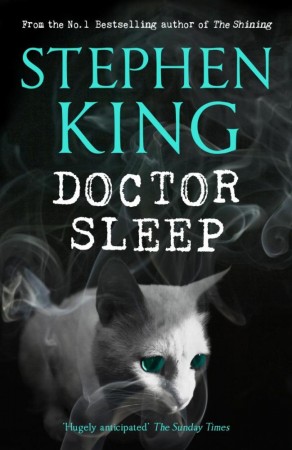Doctor Sleep – A Masterclass in Character
Stephen King’s Doctor Sleep isn’t a perfect novel.  It has inconsistencies, a few plot holes, some ‘What the …?’ moments, but they’re forgiven because King does something surpassingly well, something that drags us into the story and keeps us reading right through.
It has inconsistencies, a few plot holes, some ‘What the …?’ moments, but they’re forgiven because King does something surpassingly well, something that drags us into the story and keeps us reading right through.
Character. Stephen King does character like few others can.
When I run writing workshops, I often bang on about the elements of story. Just as often, I then go on to declare that of all the elements of story, character is the most important. If a writer does character well, the story will work. If all the other story elements are wonderful, but the story’s characters are dull, flat, or unengaging, then the story is likely to fail.
The key word here is ‘engaging’. If a writer creates engaging characters, readers will keep reading to see what happens to them, it’s as simple as that. King has a knack for creating engaging characters. Strike that, it’s not a knack – it’s something that he works at in a hundred different ways.
The two main characters in Doctor Sleep are Dan Torrance and Abra Stone. Dan is the main Point of View character. Now, while remembering that King is a Horror Writer and Dr Sleep is a Horror novel, take note of how much time King spends on non-horror stuff. A good half of the novel has nothing to do with horror. We explore Dan’s problems with alcoholism, we see his search for solace, we experience his sense of dislocation, we work through his backstory – family, work history, episodes of violence and self-loathing. To balance this, we learn about Dan through his actions, where he acts selflessly but not without internal struggle. We see him undertake work, physical labour, and he does so with care and dedication. We see his relationships with others – sometimes fraught, sometimes difficult.
And we come to understand Dan’s tortured feelings about his parents.
King keeps us riveted in Dan’s personal struggles in a thousand different ways, like turns of phrase that belong to Dan alone, or the careful formality he uses when addressing the older women in the hospice he works at, or his childish enjoyment at driving the model train, or the mannerisms that are sifted in along the way, all contribute to a rounded, breathing character.
Mannerisms. I’d really like to use an example here, but the most important mannerism in this book is a key plot point, and I don’t’ want to get into spoiler territory. Let it be said that the mannerism is deftly dropped in nice and early then touched on a few times throughout so that when the key moment comes you not only have a fine example of using mannerisms to establish and maintain character, you have a superb example of foreshadowing. King is a craftsman.
King uses memories, too, and this is particularly important since this book is ‘many years later’ sequel to The Shining. Dan’s flashbacks and musings fill us in on what has happened in the years since the Overlook Hotel burned down, but the time he spends dwelling on these events serves another purpose – they show us that he’s a thoughtful, reflective person.
All of this works independently from the horror aspects of the book. And, of course, when the horror elements are introduced, they are all the more horrific because they are contrasted with these everyday elements of a realistic life. Thanks to King’s careful characterisation, we keep turning the pages, on the edges of our seats because we care for Dan and Abra, we want to see if they will prevail or if they will succumb to the evil.
King manages to do all of this subtly, with a lightness of touch that is masterly. We don’t see him at work because we are engrossed in the characters and the narrative. He doesn’t draw attention to his methods – they work away undetected.
Doctor Sleep is a masterclass in character and characterisation.